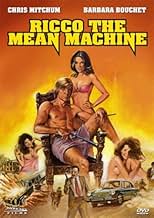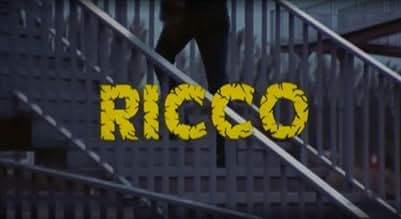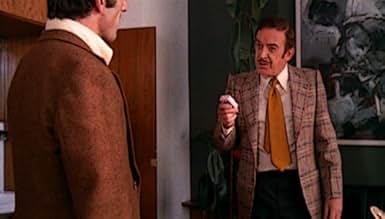Agrega una trama en tu idiomaAfter a two-year stint in prison, the son of a murdered Mafia Don teams up with a sultry con-woman to get revenge on the drug smuggler who killed his father and stole his girlfriend.After a two-year stint in prison, the son of a murdered Mafia Don teams up with a sultry con-woman to get revenge on the drug smuggler who killed his father and stole his girlfriend.After a two-year stint in prison, the son of a murdered Mafia Don teams up with a sultry con-woman to get revenge on the drug smuggler who killed his father and stole his girlfriend.
- Dirección
- Guionistas
- Elenco
Antonio Mayans
- Nightclub Bartender
- (as Juan Antonio Mayans)
Opiniones destacadas
Whoo-hoo, what a film! This film is lots of fun. Of course not in the masterpiece kind of way. Tulio Demicheli's "The Mean Machine" is a pretty bad flick indeedy. But it's such a perfect example of Euro-Trash, that I felt someone had to mention it. First off, it has Christopher Mitchum (where else can an a major actor's son find work? In Italy of course!) giving such a wooden performance, that my roomate mearly rolled his eyes, snickered, and walked out of the room shaking his head (c'mon Tony, you know you did). Christopher with his Dad's droopy eyes just stares off with that same blank expression through out the entire film. Of course he must have known it was a pretty bad script, so I won't fault him too much (I haven't seen his other artistic efforts). But it really cracked me up that on the video box there was this drawing of him looking handsome and muscular, which he definately is not. He was pretty wimpy looking, and evertime he tried to give a macho pose, or flex his authority, I nearly laughed myself silly. Though I excuse all of this, because the real reason I rented this flick was because of the wonderful and beautiful Barbara Bouchet! And this film delivers! She does this great little strip dance in front of these gangsters in a car, right before Chris (Rico the "Mean Machine") throws them into a lake! It's so funny, that Italy will take any oppertunity they can to show off Barbara's attributes. Of course it gratuitous, but it's just too much fun! And of course even after the big ambush, Chris looks to Barbara and she's still has no clothes on. She's having a good time tackling gangsters in the nude! Well, at least Barbara looks to be having fun. Another Euro-babe favourite Malisa Longo (as Chris' ex-girlfriend)also likes to spend her time flirting with Bodygaurds and sitting around in the buff. But unfortunately she meets with a very grizzly end, and becomes the film's sacrificial lamb (what else was gonna come of her character? Chris Mitchum was now with Barbara Bouchet.) in a tub of Acid! This film contains all the unnecessary violence (gory stuff as well), nudity (lots of it), macho posturing (Chris' Ricco is not opposed to giving a lady a smack if she's not behaving), and crummy acting that 70's Italian cinema is so famous for. Would I recommend it? Hardly! Did I laugh my fool head off? Yep! After this review, I'll let the reader make their own call. Barbara Bouchet is amazing!
The title suggests that Cauldron of Death is going to be another Giallo-styled thriller (Italian marketing campaigns...), but it turns out that this film is actually a part of seventies Italy's other big export; the Dirty Harry-influenced cop flick! Cauldron of Death is a little more nasty than a lot of the genre, however, as it features plenty of grisly murders, including some unlucky victims that find themselves being thrown into a vat of acid, a la our featured criminals' favourite method of dealing with people that annoy them. The story doesn't actually focus on the police like a lot of these seventies Italian crime movies, and the centre of the plot is Rico; a young man recently released from jail and thirsty for revenge on the man that killed his father (which we see at the opening of the film). The guilty party is a mobster named Don Vito, and he's certainly an adversary to be reckoned with as Rico, two years since he was sentenced to jail, is forced to match wits and out everything on the line to get revenge on the vicious Don Vito.
The film benefits from a good female duo. I'll watch anything that features the lovely Barbara Bouchet, and she doesn't disappoint here as we get treated to one of the best striptease scenes in Italian cinema! The film also features Malisa Longo, who adds to the eye candy. The men aren't bad either, as while Robert Mitchum's son Christopher is a little too naive looking for my liking; he still plays his part well. Arthur Kennedy rounds off a good central cast as the vicious Don Vito. Director Tulio Demicheli succeeds at generating a fetid atmosphere for the film to take place in, and the nasty death scenes certainly don't feel out of place considering the look and nature of the movie. The main problem with the film stems from the plotting. You'd be a fool to go into a cheapo seventies Italian thriller expecting a thoroughly well thought out plot; but this one veers off course a bit too often, and it can become distracting after a while. It's not a fatal problem; however, as Cauldron of Death is an entertaining and gritty little thriller that is well worth seeing if you can find it!
The film benefits from a good female duo. I'll watch anything that features the lovely Barbara Bouchet, and she doesn't disappoint here as we get treated to one of the best striptease scenes in Italian cinema! The film also features Malisa Longo, who adds to the eye candy. The men aren't bad either, as while Robert Mitchum's son Christopher is a little too naive looking for my liking; he still plays his part well. Arthur Kennedy rounds off a good central cast as the vicious Don Vito. Director Tulio Demicheli succeeds at generating a fetid atmosphere for the film to take place in, and the nasty death scenes certainly don't feel out of place considering the look and nature of the movie. The main problem with the film stems from the plotting. You'd be a fool to go into a cheapo seventies Italian thriller expecting a thoroughly well thought out plot; but this one veers off course a bit too often, and it can become distracting after a while. It's not a fatal problem; however, as Cauldron of Death is an entertaining and gritty little thriller that is well worth seeing if you can find it!
Christopher Mitchum is woefully miscast as son of dead mafioso out of jail and out for revenge. He's pitched against evil soap factory owner/drug smuggle Arthur Kennedy, who dissolves his enemies in sodium hydroxide and turns them into soap. On the way we get a particularly graphic murder, an amusing face dissolving in an alkali vat special effect and plenty of people getting double crossed and/or shot. The plot is thin and at times stupid, the acting pretty dreadful, Barbara Bouchet is useless as ever as the love interest. But it has strengths - great urban and countryside visuals, a fair amount of sleaze, decent pacing. Most of all - it's clear that all involved seem to have had a fairly good understanding of quite how ludicrous the entire enterprise is and don't hold back from hamming it up where necessary. Most of all, despite the flaws, the whole thing barrels along sufficiently fast and efficiently to avoid boredom ever setting in. At the very least a fun watch if you're into this sort of thing.
Rico Aversi(Christopher Mitchum)is the son of a murdered mafia chief,who is slowly engulfed by a world of forgery and drugs in order to avenge his father's slaying.His adversary,Don Vito(an excellent Arthur Kennedy,who never achieved the recognition he deserved),is cruel,vicious and has years of gangland experience on his side.Here is a battle of wits,blood and violence that ends in a powerful and dramatic climax."Mean Machine" is a memorable Italian crime thriller.It has wall-to-wall nudity(supplied by Malisa Longo and Barbara Bouchet),plenty of gunplay and some nasty bits of gore for example the castration scene.The film is pretty hard to find,but you should search for it.My rating:7 out of 10.
"Ricco", better known as "Ricco, the Mean Machine" is an outlier among Poliziotteschi for quite a few reasons. This sub-genre of Italian film was clearly inspired by American productions such as "Dirty Harry", "The French Connection", and perhaps most notably, "The Godfather".
Some have noted the difference in portrayal of the mafia in Italian flicks as opposed to American ones, ie. The portrayals being far less flattering in the country of la cosa nostra's birth. Italians had actually had run-ins with the real mafia, it was speculated, or perhaps they grew up hearing tales. They knew, better than anyone, that there was no honour among thieves.
So in its portrayal of this forever-famous, vaunted criminal organisation, how is "Ricco" different from other Italian flicks from the same time, about the same subject? For one thing, the movie lacks the relentlessly grim and self-serious tone that pretty much every other Italian mafia flick has. It's also not concerned with realism: in fact, it feels more like a Bond flick than a serious crime movie.
Christopher Mitchum is miscast as a guy who just got out of jail and is now on the warpath for some mafia boss - unoriginally named Don Vito - who he thinks killed his father. Though, of course, Christopher Mitchum is miscast as anything other than a surfer bum and the talentless son of a movie star. He inherited his dad's indifference to the craft of acting, but not much else.
Adding to the Bond villain comparison is the villain owning a factory with a pool full of acid he feeds people to. He, along with all the characters, seem like broad archetypes, ie. Good guy, bad guy, love interest, henchmen. None of this suits a mafia flick where shades of morality are absolutely necessary, especially when the "good guy" is a criminal too.
The biggest point of contrast between "Ricco" and other Poliziotteschi, though, and the only thing it seems to be remembered for, is its heavy violence. It's not the most violent Italian crime flick of this time - leave it to the gore-met, Lucio Fulci, to give us that with "Contraband". But the focus is on violence more than anything else. Look out for a shot where two guys have their heads smashed into the wall, and the camera zooms in so that we can see their distorted bloody faces at the moment of impact. The camera substitutes for the wall so it's like they're being bashed against its lens.
Probably the only scene that anybody will remember the movie for, though, is an unconvincing, though still garish, castration scene, which is followed by a more-graphic acid bath.
You know, I didn't know who was getting castrated, or who was getting burned. Does that surprise you? I mostly didn't follow the smaller details of this movie's silly story. Christopher Mitchum is definitely not one to watch when you want to go deep into a film, since his commitment to the role is barely more than Matt Hannon's in "Samurai Cop".
I still enjoyed "Ricco", though. It wasn't nearly as boring as most Poliziotteschi - there's yet another difference for you.
Some have noted the difference in portrayal of the mafia in Italian flicks as opposed to American ones, ie. The portrayals being far less flattering in the country of la cosa nostra's birth. Italians had actually had run-ins with the real mafia, it was speculated, or perhaps they grew up hearing tales. They knew, better than anyone, that there was no honour among thieves.
So in its portrayal of this forever-famous, vaunted criminal organisation, how is "Ricco" different from other Italian flicks from the same time, about the same subject? For one thing, the movie lacks the relentlessly grim and self-serious tone that pretty much every other Italian mafia flick has. It's also not concerned with realism: in fact, it feels more like a Bond flick than a serious crime movie.
Christopher Mitchum is miscast as a guy who just got out of jail and is now on the warpath for some mafia boss - unoriginally named Don Vito - who he thinks killed his father. Though, of course, Christopher Mitchum is miscast as anything other than a surfer bum and the talentless son of a movie star. He inherited his dad's indifference to the craft of acting, but not much else.
Adding to the Bond villain comparison is the villain owning a factory with a pool full of acid he feeds people to. He, along with all the characters, seem like broad archetypes, ie. Good guy, bad guy, love interest, henchmen. None of this suits a mafia flick where shades of morality are absolutely necessary, especially when the "good guy" is a criminal too.
The biggest point of contrast between "Ricco" and other Poliziotteschi, though, and the only thing it seems to be remembered for, is its heavy violence. It's not the most violent Italian crime flick of this time - leave it to the gore-met, Lucio Fulci, to give us that with "Contraband". But the focus is on violence more than anything else. Look out for a shot where two guys have their heads smashed into the wall, and the camera zooms in so that we can see their distorted bloody faces at the moment of impact. The camera substitutes for the wall so it's like they're being bashed against its lens.
Probably the only scene that anybody will remember the movie for, though, is an unconvincing, though still garish, castration scene, which is followed by a more-graphic acid bath.
You know, I didn't know who was getting castrated, or who was getting burned. Does that surprise you? I mostly didn't follow the smaller details of this movie's silly story. Christopher Mitchum is definitely not one to watch when you want to go deep into a film, since his commitment to the role is barely more than Matt Hannon's in "Samurai Cop".
I still enjoyed "Ricco", though. It wasn't nearly as boring as most Poliziotteschi - there's yet another difference for you.
¿Sabías que…?
- TriviaRoger Ebert and Gene Siskel cited this movie as Dog of the Week on their TV show.
- ConexionesFeatured in Ultimate Poliziotteschi Trailer Shoot-Out (2017)
Selecciones populares
Inicia sesión para calificar y agrega a la lista de videos para obtener recomendaciones personalizadas
- How long is The Mean Machine?Con tecnología de Alexa
Detalles
Contribuir a esta página
Sugiere una edición o agrega el contenido que falta

Principales brechas de datos
By what name was Ricco (1973) officially released in India in English?
Responda
































